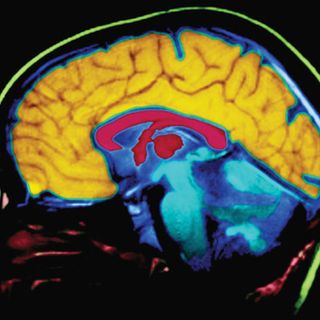
All The Arguments You Need: to Convince People That Therapy Is Not a Scam
Here’s what to say when people suggest outlandish cures for real mental health disorders.

In our All The Arguments You Need series, we take on mindsets standing in the way of progress and rebut them with facts and logic.
Navigating the turbulent waters of talking about one’s mental health is often a nauseating affair. Anyone who’s attempted it has likely been the recipient of insensitive statements ranging from the callous to the deeply absurd. Spending a considerable amount of time knocking sense into supplement guzzling life-coach bros and astrology-mad concerned aunties, is more mentally taxing than result-oriented. Sometimes, dealing with friends and loved ones who clearly have a problem but refuse to accept it can also be mentally exhausting.
Trying to steer the skeptical lot towards reason, or helping them seek the medical attention they need, might seem like a Herculean task most of the time. Still, on days when you’re feeling generous with your time and energy, here’s a list of arguments that can help change attitudes towards seeking professional help for mental struggles and disorders.
You don’t need a therapist. You’re just lazy. You need to build willpower and just get shit done as we used to in our time.
All about that #hustle, huh? How does one define laziness anyway? Taking an hour off laziness isn’t laziness because it’s just a break. Being homeless isn’t laziness because nobody is hiring people who can’t bathe. A debilitating malfunction in your brain that brings your #hustle to an abrupt halt isn’t laziness because…well, you get the picture.
“We attribute laziness to people when they have failed to do specific tasks that we value,” writes Jenna Baddeley in Psychology Today.
Often, a mental illness like depression can impede a person to such an extent that they can’t wash the dishes or leave the bed or use the bathroom. This isn’t because they chose not to; its because their brain is so swamped, so tired, so weighed down that even basic hygiene — something that’s second nature to almost all human beings — is nowhere near a priority.
“Usually, if you’re just feeling lazy, it’s a passing mood that within a day or two, will pass. Soon enough, you get up, you go to class or work, you clean the apartment. You do what’s needed, and you have the ability to do so,” writes psychologist John M. Grohol in PsychCentral. He adds, “Depression doesn’t just last for a day or two. For clinical depression to be diagnosed, it requires you to feel that same, unmotivated way for at least 2 weeks (according to the American Psychiatric Association). Most people who suffer from this condition go weeks — and sometimes even months — feeling horrible, unmotivated, lonely, and in despair before ever seeking treatment.”
Related on The Swaddle:
What to Expect from Therapy – and What Not to Expect
Mental health, therapy and all is a Western idea. Indians don’t have or need all this nonsense.
This is the equivalent of pushing an elephant under a tiny rug. India has a massive mental health problem: a 2016 World Health Organization report suggested that India is the second-most depressed country in the world. At least 5% of the Indian population live with a mental illness, which translates to more than 50 million people. Suicide rates for men and women in India are much higher than the global average. This sounds like a very alarming, indigenous problem that India needs to wake up to.
Besides, the human brain functions and experiences dysfunction regardless of race or location. Mental health is a global problem that has existed regardless of time, and the only difference noticed is increasing positive awareness around getting help from a therapist for any form of dysfunction.
Often, Indian stigma against seeking mental health is in direct relation to social status. People who openly seek help for mental health might face derision or lose out on marriage prospects due to being marked as ‘mentally ill.’ Sacrificing the ability to seek help for status, or for an eligible match, will not ease the pain; many well-loved and happily married people have succumbed to mental illness. Getting therapy is seeking help for a chronic problem, much like sinusitis or asthma.
Why hire a therapist? You can just do yoga/work out/take these pills, and all your problems will disappear.
This is a half-truth. Exercise does release a lovely amount of endorphins that triggers positivity, and meditation increases focus, but these are temporary reprieves. Exercise is also only useful as a treatment for those suffering from mild to moderate depression, which is only a subset of the population group struggling with mental health problems.
“People experience anxiety, no doubt about it, but [most] don’t have an anxiety disorder,” Jennifer Payne, an associate professor of psychiatry and behavioral science at Johns Hopkins School of Medicine told Vice. “Yoga is fabulous and can be great for anxiety, but it’s not going to cure an anxiety disorder.”
Though wellness blogs will want you to believe so, nobody can take supplements and exercise their mental health struggles away. To fully experience the benefits of a good exercise routine, there still needs to be guidance from a therapist to make sure that symptoms are under control without being attached to a treadmill 24/7.
Related on The Swaddle:
How and When Therapy Can Help Kids
Therapists will pump you full of drugs and make you an emotionless shell.
Therapists can’t prescribe medication. That responsibility lies with people who are medically qualified to do so i.e. registered psychiatrists (child and adult) and psychiatric nurses. Therefore, if a person does go to a therapist for mental health-related struggles, they will only receive the form of therapy that requires words and actions.
Besides, if a person is diagnosed with a serious mental health disorder, taking medication can be the difference between functional and bedridden. The ‘drugs’ in question are anti-psychotics, anti-depressants, and more, prescribed to be used a certain way by psychiatrists with medical training. Naturally, these drugs — like almost all other physiological treatment drugs — have side effects. Taking medication for any dysfunction and making peace with side effects is a wilful compromise anyone with a chronic illness must make in order to feel a certain level of comfort and functionality.
The idea that taking medication is an ‘easy fix’ is steeped in stigma against mental illness. Curing disorders isn’t a face-off with respect to who was more hardcore while curing their mental illness. Mental illness is a health problem, and you take the medication required to treat that problem. It’s really not that deep. Besides, better a temporary emotionless shell than dead, right?
I don’t want to be labeled ‘mentally ill’ or put into a box.
Good news! Some therapists prefer treating their patients without immediately diagnosing them, as mental illness can often occur as a combination across different illnesses and conditions – for example, borderline personality disorder and bipolar disorder.
“If you’re a client or patient of a mental health professional, if labeled, ask the practitioner for the labeling’s basis, how solidly s/he believes it’s valid, and importantly, how the label is helpful in improving your life. Is it possible that rather than pathologizing you as diseased, you’d be wise to accept at least some of your non-standard behaviors as mere individual differences?” writes Marty Nemko, Ph.D., in Psychology Today.
The beautiful thing about therapy is the mutable ways in which it can help. While some people believe a diagnosis would greatly help them process the magnitude of what they’re dealing with, others would prefer their therapy to be devoid of boxes and limitations, treating symptoms rather than conditions. If being public about mental illness is a worry, there’s no harm in being discreet about seeking help till one makes their peace with the problem they’re dealing with. Therapy isn’t shameful, or a system to slot one’s personality — it only exists to help one care for themselves, feel neutral and function better.
Aditi Murti is a culture writer at The Swaddle. Previously, she worked as a freelance journalist focused on gender and cities. Find her on social media @aditimurti.
Related


Finally, We Have Biological Clues About Women’s Higher Alzheimer’s Disease Risk
